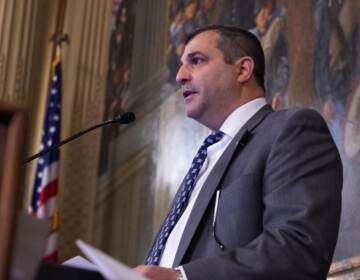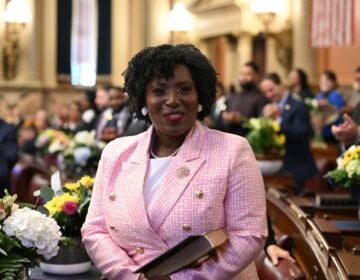Lobbyist says she was harassed by current Pa. lawmaker, wants legislature to change misconduct rules
A lobbyist for one of Pennsylvania’s most influential unions says a sitting state House lawmaker sexually harassed her.

File photo: Pennsylvania Capitol in Harrisburg, Pa., on April 4, 2022. (AP Photo/Matt Rourke, File)
This story originally appeared on Spotlight PA.
A lobbyist for one of Pennsylvania’s most influential unions says a sitting state House lawmaker sexually harassed her, and she is urging the legislature to expand internal rules that govern who can bring misconduct complaints.
Andi Perez, who advocates on behalf of Service Employees International Union 32BJ in Harrisburg, plans to make the allegation Friday evening in Philadelphia during a listening session organized by new state Houser Speaker Mark Rozzi (D., Berks).
Rozzi has scheduled a series of public meetings to solicit feedback about the state House’s operating procedures amid partisan deadlock over which political party controls the chamber. The sessions offer a rare opportunity for Pennsylvanians to directly weigh in on the rules, which in most years are quickly adopted at the beginning of each new legislative session.
Perez said she was harassed by a male lawmaker while discussing a bill outside of the Capitol building, according to prepared testimony reviewed by Spotlight PA. She did not provide the lawmaker’s name, his party affiliation, or additional details.
The lawmaker “decided to caress my leg while I was wearing a skirt all the while telling me he was impressed by my passion and knowledge of the issues we were discussing,” Perez plans to say. “I moved away from him hoping he would stop — he did not.”
“I could sit here for hours telling you the range of emotions I felt after this,” she wrote in the remarks. “Of course I was full of rage at the disrespect and arrogance it requires to so brazenly sexually harass me in a public place where I am just trying to do my job for the workers in my union.”
Perez attempted to file a complaint with the state House Ethics Committee, according to her testimony, but was told “sorry, the rules do not allow you to file a complaint since you are not an employee of the House. There was nothing in the House Rules that allowed leadership to officially take any further action.”
A spokesperson for state House Democrats did not immediately respond to a request for comment. A spokesperson for the chamber’s GOP caucus said it had “not been made aware of the referenced allegation.”
In 2019, state House leadership added workplace protections to the chamber’s rules for the first time, banning “unwelcome sexual advances, requests for sexual favors or other verbal or physical conduct of a sexual nature.”
The change was made after two women accused a male lawmaker of physical and sexual abuse, but he continued to serve in the legislature until the end of his term. One of the women was also a state lawmaker and received a restraining order against him.
As Spotlight PA previously reported, the policy only covers state House employees. That has meant individuals who regularly interact with lawmakers — such as other government employees, lobbyists, constituents, and journalists — have been unable to report an allegation to the committee.
Perez wants the legislature to adopt sexual abuse and harassment policies that cover more people who interact with lawmakers in the course of their official duties, according to her testimony.
“No one is above the law,” Perez wrote in her prepared remarks. “A lawmaker who harasses someone should be held accountable by their own peers through an Ethics process.”
The state House and Senate typically adopt rules on the first day of a new two-year legislative session after leaders hammer out the details behind closed doors.
The upper chamber did so on Jan. 3, but the rules remain unfinished in the lower chamber. Democrats are awaiting the outcomes of special elections expected to give them a one-vote majority — which would allow the party to set the rules without compromise — while Republicans, facing internal divisions, have unsuccessfully tried to force the chamber back in session.
Rozzi has canceled future sessions of the state House and convened a bipartisan committee to negotiate the rules. According to his office, he scheduled the listening tour to “yield solutions to partisan gridlock” and to figure out a path to advancing a proposed constitutional amendment that would give survivors of childhood sexual abuse a chance to sue their perpetrators.
The latter is a personal cause for Rozzi, who himself is a survivor.
The hearings provide an unusual opportunity for public discussion of the rules, which dictate how easy or hard it is for bills to become law and, importantly for Perez and other advocates, disciplinary procedures for lawmakers.
According to her testimony, Perez’s experience has already prompted a response inside the legislature. State Rep. Kate Klunk (R., York) last year proposed a rule change to explicitly ban state House lawmakers from engaging “in sexual harassment while performing House-related services or duties or in or on any House-owned or leased property or facilities.”
Perez said Klunk’s proposal, which was not adopted, would be a “step toward changing the culture of Harrisburg.”
As in the state House, state Senate rules only allow the chamber’s lawmakers and employees to bring internal sexual harassment complaints.
In early January, state Sens. Katie Muth (D., Chester) and Lindsey Williams (D., Allegheny) pressed the chamber to adopt rules that would cover non-employees, an effort rebuffed by Republicans.
“Sen. Muth and I want to make sure that every person in that building is protected and has a safe place to report misconduct,” Williams told Spotlight PA.
While chamber-wide efforts failed, Senate Democrats are in the process of amending an internal ethics policy to add sexual harassment protections for non-employees, Williams said.
Both pushes have been backed by SEIU, as well as a number of other labor unions and progressive advocacy groups.
In letters sent to lawmakers in both chambers earlier this month, the coalition called for expanded rules.
“How the House chooses to govern itself is a message to every workplace and employer in the state. It sets a standard to which the commonwealth should hold itself,” the letter said. “Passing [Klunk’s] resolution would tell anyone who comes to advocate before the House that they will be protected from harassment, and that their safety is of the highest concern.”

Get daily updates from WHYY News!
WHYY is your source for fact-based, in-depth journalism and information. As a nonprofit organization, we rely on financial support from readers like you. Please give today.





